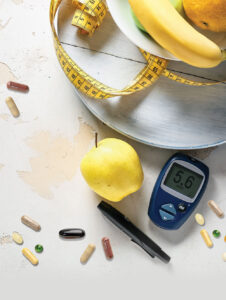Statistics may show an improvement, but retailers still need to take a handson approach answering consumer questions and providing guidance.
According to the Centers for Disease Control and Prevention (CDC), approximately one in every six adults—16.3 percent of the U. S. adult population—has high total cholesterol, the level defined as 240 mg/dL and above. People with high total cholesterol have approximately twice the risk of heart disease as people with optimal levels (lower than 200 mg/dL). For adult Americans, the average level is about 200 mg/dL, which is borderline high risk.
But the CDC noted that Americans are, in fact, making progress with their cholesterol struggles, saying that compared to previous decades, fewer adults have high cholesterol. The proportion of the population aged 20-74 years with high cholesterol has dropped by half, from 33 percent in 1960-62 to 16.3 percent in 2003-06. During the same time period, average cholesterol levels fell from 222 mg/dL to 200 mg/dL.
Statistics aside, improvement is not what most natural retailers are observing with their customers.
An example is The Health Food Store, which has been serving rural Mississippi for more than 20 years through its flagship store in Pontotoc and a new location opened in January in Tupelo. “A big percentage of customers (particularly over the age of 40) that visit our stores have been told by their doctors that they have high cholesterol. We also have a lot of customers that come see us due to negative side effects from already prescribed cholesterol medicines,” said Owner Michelle Barbieri. “Both groups are looking for natural alternatives.”
It’s a similar situation for Eunice Green, owner of Green’s Nutrition, based in Stockton, CA for 20 years. Very familiar with her shoppers, Green said she has observed cholesterol becoming more of a concern for her customers of late.
“In the last few years, doctors have concentrated more on not only lowering cholesterol through the use of statin drugs, they are now also recommending them for prevention-even when cholesterol is normal or only slightly elevated,” she said, noting that the change in level markers of what are normal levels has added to customer confusion. “I feel that most customers do not understand cholesterol, what is normal and how they can deal with this problem. Most of the time, they are somewhat fearful and do not know what they want, so they are very receptive to advice about what is a good cholesterol product.”
Misconceptions
Guiding customers to a thorough understanding is a primary concern for Dan Chapman, CEO of Sunrise Health Food Stores, a two-store chain in Lansing and Flossmoor, IL that celebrated its 50th anniversary last year. “Many customers believe cholesterol is just plain bad, but the truth is that we need cholesterol for health. It is a vital component in human metabolism, so we’re helping the customer understand that the solution for high cholesterol levels is about much more than just lowering them,” he said. “With our more than 50-year history, many of our customers trust us to make the best suggestions for their health issues. Others will ask about specific ingredients they have either been told or have read about.”
Master Herbalist Oron Cohen, founder of GreenSilk.com LLC in California, explained that cholesterol is a fat (lipid) that comes from diet and is also produced by the liver. It is a vital component of every cell in the body and is used by the body to produce hormones and vitamin D. “However, when there is an excess amount of ‘bad’ cholesterol (LDL, or low density lipoprotein) present in the blood, it can block the arteries and may ultimately result in heart attacks and increase the risk for diabetes, high blood pressure, thyroid disorders, kidney and liver diseases, creating a myriad of other health problems,” he said, adding that oxidized LDL can produce inflammation in the arteries that supply blood to organs and other tissues, thus promoting the risk of cardiovascular disease known as atherosclerosis (hardening of the arteries). “Once LDL becomes oxidized, it goes directly within the inner lining of any artery in the body creating havoc in the circulatory system.”
Mulberry leaf extract (Morus alba) is the core ingredient in GreenSilk’s Formula 1, which combines synergistic herbs that provide natural support for lowering and managing cholesterol levels. “Mulberry leaf extract is scientifically proven to naturally and effectively suppress the progression of atherosclerosis. Two of the biologically active flavonoid compounds, isoquercitrin and astragalin, were found by Japanese researchers to be major contributors to the antioxidant effects of mulberry leaves on LDL-cholesterol,” said Cohen, also noting that a 30-day clinical trial conducted at the Department of Science in India that showed mulberry leaf extract was reduced LDL cholesterol by more than 23 percent while increasing HDL cholesterol by more than 18 percent.
“GreenSilk Formula 1 does not utilize any synthetic elements such as binders and fillers, as they can pose an adverse effect on the body’s ability to absorb the natural phytochemical element of any plant,” he added.
The key product developed by Michigan-based Uckele Health & Nutrition to address cholesterol balance is Lipisterin, which includes nutrients, enzymes and plant extracts that can supply factors to directly support the liver’s ability to properly metabolize HDL and LDL cholesterol and healthy fat metabolism, according to Jack Grogan, CN, chief science officer. The product offers plant extract guggul; red yeast rice; pineapple enzyme, bromelain; amino acid, taurine; digestive enzyme, pancreatin; CoQ10; plant extracts policosanol and octacosanol; and vitamins C and B5.
“Lipisterin is a full spectrum combination formula with each ingredient at significant dosage levels for maximum support. It is a carefully crafted, synergistic formula with substantial levels of activeingredients,” said Grogan, adding that Lipisterin comes in a powdered capsule to deliver maximum absorption and assimilation of each ingredient.
A Numbers Game
The Health Food Store’s Barbieri offered that her customers’ are actively seeking assistance for their cholesterol questions. “’What is HDL, or LDL or VLDL?’ or ‘What does it mean to have high triglycerides?’ are just some of the questions we’ll get,” she said. “Many of our customers have even brought to us their blood work results, asking for help understanding the numbers and are looking for advice.
“The biggest challenge in the cholesterol category we face is trying to help customers who insist they want to come off prescriptions because of negative side effects, and finding doctors that will partner with us in helping with the customer’s request,” said Barbieri, who seeks supplier partners that can provide brochures or literature for customers to share with their doctors for approval.
“As more consumers become familiar with the side effects of cholesterol-lowering pharmaceuticals, many are seeking more natural alternatives,” said Jay Levy, director of sales with California-based Wakunaga of America Co. Ltd., who noted that new studies continually point to the ability of certain foods, herbs and nutrients to lower cholesterol levels. Case in point: several recent clinical studies out of UCLA Medical Center on Kyolic Aged Garlic Extract (AGE) have shown significant data to support not only cholesterol- lowering benefits, but also other cardiovascular improvements. “These Kyolic clinical studies have been presented at the American Heart Association conferences, and other top medical symposiums, which has helped support the natural products market, build greater health professional acceptance and increase consumer confidence in supplements,” said Levy.
The health benefits of Kyolic AGE have been the focus of 700 published papers, with many of these studies focusing on cholesterol and heart health. Among the most recent is a 2009 study conducted at UCLA Medical Center. This placebo-controlled research study1, led by Matthew Budoff, MD, tested Kyolic Formula 108 in a group of 65 patients at risk of cardiovascular disease. After 12 months, those taking Kyolic 108 had less calcified plaque in their arteries and lower homocysteine levels. In addition, Budoff and colleagues reported that they also had lower total cholesterol and that “aged garlic extract was associated with a significant increase in HDL-C.”
Beyond Kyolic Formula 108, which combines AGE with vitamins B6 and B12, folic acid and L-arginine to support healthy homocysteine levels, as well as normal cholesterol and blood pressure levels while enhancing circulation, Wakunaga offers a number of dietary supplements designed to promote healthy cholesterol levels. But where the use of statin medications are a key concern, Levy highlighted the company’s Kyolic Formula 106- Healthy Heart, which along with AGE also contains vitamin E, hawthorn berry and cayenne pepper. “These widely studied nutrients have been shown repeatedly to benefit both the heart itself and the circulatory system,” he said. “In fact, a 2009 Australian study comparing a statin drug to hawthorn found that both total and LDL levels were reduced in the hawthorn berry group, but only total cholesterol levels decreased in the statin group.
“The Kyolic family of products for cholesterol management shares a key element—Aged Garlic Extract. It’s hard to find another supplement that has generated so much published science for cardiovascular benefit,” added Levy, noting that cholesterol is only one marker of cardiovascular disease. “It’s also important to support arterial health and normal blood pressure levels. This is why Wakunaga offers a full range of products that support all aspects of cardiovascular health.”
Educating Through Confusion
Green’s Nutrition staff works hard educating its customers, providing materials, books and often holding seminars with “out-of-town” experts, who are usually trainers or reps from supplier partners. One rep that has made a real impression on Green and her customers is Joe Robello from Dr. Rath USA, Inc. in California, whom Green described as “a wonderful presenter.”
Dr. Rath’s Healthy Cholesterol formula is Green’s top-selling cholesterol product, and she credits its popularity with the hands-on approach the store receives from the company. “The materials, training and support from our Dr. Rath representative has been invaluable in educating our customers,” said Green. “I think the Dr. Rath formula is very popular as the support materials are easy to read and make a lot of sense. The book Why Animals Don’t Get Heart Attacks…But People Do is also a wonderful resource for my staff as well as my customers.”
All of Dr. Rath’s Cellular Health™ Formulas are based on the principle of Nutrient Synergy, according to Dr. Aleksandra Niedzwiecki, the director of the Dr. Rath Research Institute and a representative of Dr. Rath USA, Inc. She noted that the scientific team has proven that a specific combination of chosen nutrients works better than mega dose of any single nutrient.
“Dr. Rath Healthy Cholesterol Formula is based on a new understanding of the root cause of increased cholesterol levels in the body, and is a comprehensive program that addresses the key metabolic aspects that can lead to elevated cholesterol levels,” she said. “Therefore, our micronutrient program targets:
• Health and integrity of blood vessels as the critical factor for the increased needs for cholesterol as a ‘repair’ factor (through vitamins C and B6);
• Optimum cholesterol synthesis and metabolism (through vitamins C and B3, or niacin);
• Regulating cholesterol absorption in the gastrointestinal track (through beta sitosterol and apple pectins);
• Protection against vascular wall damage by homocysteine (through vitamins B6 and B12, folic acid and betaine); and
• Protection against oxidation of cholesterol molecules, which increases their atherogenicity (through vitamins C and E as mixed tocopherols).
“According to Dr. Rath, elevated blood cholesterol is only a secondary risk factor,” Niedzwiecki explained. “Its internal production increases as a response to structural weakness of artery walls due to impaired collagen production by the vascular cells. Cholesterol functions as a biological ‘repair’ factor to compensate for cracks and lesions in the blood vessel wall. However, if the weakness of the vascular wall persists for years, then cholesterol becomes a risk factor triggering the formation of plaques and cardiovascular disease.
“We believe that natural supplement retailers play a vital role in the education of the public regarding all aspects of health. To aid this process, we dedicate large amounts of our resources to the creation of cutting-edge health education materials, such as consumer brochures, books and scientific information that cover not just cholesterol issues, but also all health issues.
Making these materials available to the retailer increases their expertise about health concerns, allowing them to better serve their customers, while further establishing their important position in their communities as a trusted resource for health knowledge.”
Wakunaga’s Levy concurred, offering that retailers can best assist customers by keeping information on cholesterollowering supplements simple and direct.
“There is no magic bullet,” he said. “In addition to recommending effective, science-supported supplements, suggesting other simple solutions like exercising, eating more fruits and vegetables, getting enough sleep, reducing stress, etc., helps build a long-term, heart health strategy for the consumer.”
In closing, Sunrise Health Foods’ Chapman offered another piece of advice: “Each of us as unique individuals has a genetic set level of cholesterol that should be maintained. It is important that everyone have at least some basic tests done, including cholesterol levels (preferably as young adults while they are in good health) to create a baseline. This will allow you to see changes in coming years to determine what health issues might need to be acted on.”
References:
1 Budoff M. Aged Garlic Extract supplemented with B vitamins, folic acid and L-arginine retards the progression of subclinical atherosclerosis: A randomized clinical trial. Preventive Medicine. 2009;49:101-107.
2 Xu H. A study of the comparative effects of hawthorn fruit compound and simvastatin on lowering blood lipid levels. American Journal of Chinese Medicine. 2009;37:903-908.
An Edible Approach to Cholesterol Control
Stocking approximately 3,000 individual items at The Health Food Store, Owner Michelle Barbieri estimated that more than 200 products address cholesterol concerns, which include combination formulas and single-nutrient products, to fibers, teas, oils, etc. While the staff always tries to encourage customers to include functional foods as well as fresh fruit, vegetables, high fiber foods, raw seeds and nuts, and healthy oils, Barbieri said most of her customers prefer supplements. “And the fewer pills is an added bonus,” she said. “From their standpoint, the easier, the better.”
But a new line coming to market challenges that pills might not be the “easiest” answer.
Dr. Mitchell Karl, founder and chief scientific officer of Healthy Drink Discoveries (HDD) in Florida, and a board-certified cardiologist for more than 20 years, is the creator of HDD’s Nutrxin formula for cholesterol management.
The company wanted to avoid the pill concept as many consumers simply don’t like taking them. Once the proprietary formula NUTRXIN was finalized, HDD focused on developing delivery forms that tasted great and provided the consumer with options.
“There are multiple aspects to consider when launching a functional food or beverage product, including: What is the consumer’s current mindset with regard to the health issue you are addressing? Can you provide the consumer with a product that adequately addresses the health issue, tastes good and doesn’t require the consumer to make significant changes to the current daily lifestyle?” said Karl.
HDD has created and tested samples of its EMPOWER CHOLESTEROL product line, which has been under development since 2008 and is available in beverage and food formulations including an 8-oz. Heart Drink, 2. 5-oz. Cardio Shot, Heart Bites (single- serve cookies in multiple flavors and brownie bites) and Heart Bar. The line is designed to deliver the heart healthy ingredients via two units of product daily. “This could involve consuming a beverage in the morning And cookie in the afternoon or any combination of the EMPOWER CHOLESTEROL product line,” Karl explained. “There are no special requirements for the consumer to adopt this aspect to their daily routine.”
HDD conducted a multi-center, double-blind, placebo-controlled clinical study evaluating reduction of LDL and reduction of total cholesterol at four- and eight-week follow ups in subjects with “normal” cholesterol levels as well as those who were unable to tolerate the side effects of prior statin therapy. The EMPOWER CHOLESTEROL product reduced LDL by 17.1 percent/17.8 percent and total cholesterol by 12.7 percent/14.1 percent at four/eight weeks, respectively. The results of the study were published in March 2012 in The Journal of Clinical Lipidology, a peer reviewed journal for the National Lipid Association.
All HDD products are manufactured in ISO, cGMP, halal, gluten-free and kosher-certified facilities. The commercial launch is estimated for the first quarter of 2013.




![[Sponsored Video] Special Report: Bergamonte®, the Untold Story](https://vitaminretailer.com/wp-content/uploads/2023/06/sponsored-video-special-report-b-300x169-1707947265.jpg)
![[Extra! Extra!] Talking Heart Health With Carl Germano CNS, CDN](https://vitaminretailer.com/wp-content/uploads/2024/01/Heart-Health-300x200.jpg)






